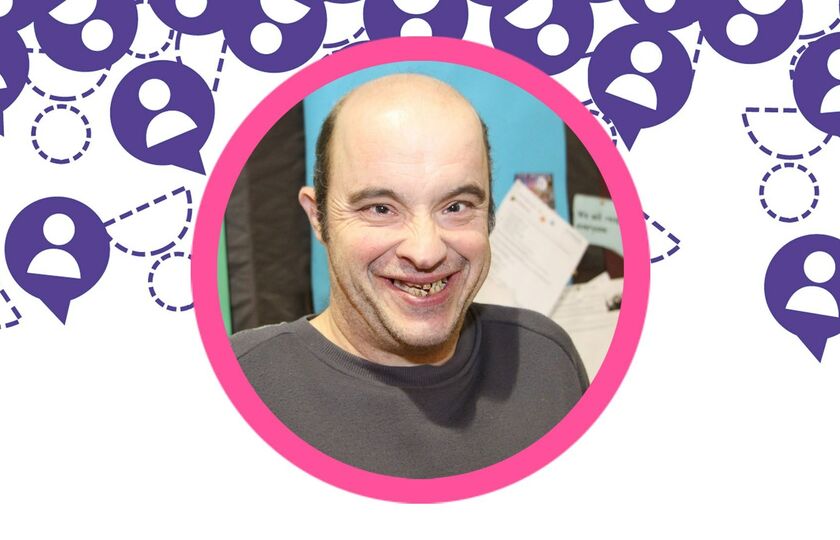Achieve Together have created an easy read guide for staying safe online for people with learning disabilities.
Supported Loving toolkit
Online relationships

When it comes to using the internet, technology or something like online dating, there should be a choice to use it or not, but choice should always be informed.
Technology offers plenty of ways to stay connected, whether it’s catching up with friends on social media, joining online groups, or exploring dating apps. For people who access support, the digital world can open up new opportunities to build both friendships and romantic relationships. But at times, it can also feel overwhelming or hard to access.
Many people haven’t had the chance to learn how to use technology safely, or they may not have the right support to understand its risks and benefits. Without that knowledge, they might not be aware of potential dangers, like privacy issues or online scams. At the same time, they could miss out on the positive side, things like building meaningful relationships or accessing helpful services. It’s important to make sure that everyone, especially those who access support, has the tools and confidence to navigate the online world.
People should have the right information to decide how and when they want to engage online. Whether it's setting up a social media profile, joining a virtual community, or trying online dating, there are plenty of ways to use technology safely. As supporters, it’s our job to guide people through these options in a way that feels right for them, helping them connect with others and enjoy the same opportunities as everyone else. This toolkit offers practical advice and ideas to help people explore relationships and connections through technology, ensuring they can do so safely, positively, and in a person-centred way.
What are the most common challenges faced in this area and how best to support people to overcome them?
Impact of isolation
Research highlights that both autistic people and people with learning disabilities frequently experience high levels of social isolation. Over a third of people with learning disabilities reported feeling lonely most or all the time, which exacerbated feelings of disconnection. This isolation often drives people to seek connections online, where they may encounter exploitation, cyberbullying, or unsafe interactions. Autistic people often connect in diverse ways, but social settings don't always support neurodivergent communication styles. Many autistic adults turn to online platforms for connection, which can be empowering but may also lead to risks if people are not equipped with the education to keep themselves safe online. Supporting people to make connections linked to personal interests (eg sport, art, or shared hobbies) provides increased opportunities to meet like-minded people, including potential partners, as opposed to just using social media or dating websites. These environments encourage conversations and friendships based on common ground, helping reduce isolation and build a sense of belonging. Additionally, online platforms can play a supportive role in maintaining relationships by enabling communication between in-person meetups, ultimately deepening connections over time.
Staying safe
Research has shown that people with social care needs are targeted by people for scams, often involving a person asking for money and saying they are their girlfriend/boyfriend. Some people are targeted and groomed for possible sexual abuse. The online world is full of unwritten rules and many people are unaware of some basic ways to keep themselves safe online.
- People can try to find love on social media, like Facebook, often accepting random friend requests from strangers or messaging people they do not know. This can result in being targeted by scammers who pretend to be someone else. Help people to recognise potential red flags, encourage them to be cautious if someone online pressures them for personal information, or if their communication feels too fast or intense eg telling them early they are in love with them. Scammers often try to move conversations away from public platforms to more private channels quickly, such as via text message or phone calls.
- Encourage them to only share information you would with other strangers, remember, they are all strangers until you start meeting in real life.
- Support the person to understand the reality of sending explicit pictures, making them aware that they cannot control what that person does with that picture and how/where it could be shared without their consent/knowledge.
- Make them aware if they repost/share an explicit image that was sent to them privately without consent, that they are committing a criminal offence.
- Encourage people to share anything they are worried about or feel unsure about with someone they trust and that they can block people if they feel uncomfortable.
- Remind them not to click on links or download attachments from people they don't know. Phishing scams can trick people into giving out personal information or downloading harmful software.
- Reinforce the importance of consent in both online and offline interactions. Ensure they understand that any online interaction should respect both their own and others’ boundaries, and that they can say no at any time.
- Encourage check-ins where they can share their online experiences. This creates an open dialogue and helps them feel comfortable reaching out if something doesn’t feel right.
Only share: basic information about likes and dislikes, local area you live in ie East London, South Liverpool.
Do not share: personal address, mobile number or email address. Get to know your privacy settings.
If you have concerns that despite support and education, a person is unable to keep themselves safe online, a capacity assessment might be needed. See this link to determine what the ‘relevant information a person would need to retain to have capacity regarding using the internet.
Meeting someone in 'real life'
If a person develops a relationship and wants to meet in person, here are some suggestions to support people:
- Encourage a video call before an actual date or meet up, so the person knows they are real! This is very popular thing to do now.
- If they make excuses as to why they can not do this, this is a RED FLAG. Most people these days have multiple devices that have a camera, or they could use someone else’s for a quick call. Help the person to understand this is a red flag, they are not real.
- Meet in a public place, suggest they could invite someone they trust to go along initially if they are happy with this. You could also get them to speak to staff on the phone if they want to check the arrangements for the date.
- Make sure they keep a fully charged mobile phone with them, perhaps you could arrange a call with them halfway through to check in.
- Remind them that they can leave at any time if they feel uncomfortable and can call someone to help them or if they feel unsafe at any point to call 999.
- You could help the person to think about how they might leave if they feel uncomfortable, excuses they could make etc.
Online dating
If a person does choose to start using an online dating app or dating site, we have some advice to help support them in this journey.
- One of the most difficult things to deal with in any dating situation is rejection, this can include not ‘matching’, being stood up or getting nasty remarks. This can be upsetting for anyone let alone someone new to the dating scene. Explain people can be mean online because they are hidden, support the person to learn that these people are sad and not worth their time. They do not know you personally so ignore their words.
- Sites with a mobile app and a website will allow the account to be used on multiple devices, so supporters could help with and monitor the activity – this would have to be with their full consent.
- Encourage them to use a site/app that allows them to share their ‘story’ as part of the profile and to consider being open and honest about their disability as it is part of their identity, as is what they are good at or the colour of their hair. It will help to reduce the harsh reality of rejection if other users are aware of their disability. Proper dating sites are better for this, or consider a disability specific site (see resources section). The Tinder app is the worst for this as you only have one sentence to sum up yourself.
- Prepare the person you are supporting to manage their expectations – it can take years for anyone to find love, even online.
- Most sites offer a range of privacy settings, and we suggest supporting people to understand how to use them.
Watch this video from Northamptonshire Healthcare NHS Foundation Trust, which can be used to demonstrate that not everyone online is honest about who they are.
Do...
- Support people if they want to use the internet - if a person has capacity this is their choice.
- Educate people about the risks and realities of the internet, explaining not everyone is always as genuine as they seem.
- Help people to keep safe online by giving education and helping people to spot the red flags in online relationships.
Don't...
- be afraid to raise alarms if something doesn’t feel right
- forget to remind people that there may be other options, such as a local supported dating agency, social clubs and shared hobby groups they could join
- assume people know how to use the safety functions on various sites such as privacy setting and how to block – support people to understand this.
Case study
Jade is 22 and loves romance films, so it’s no surprise she’s always dreamed of having a boyfriend. She often sees her friends talking about dating apps and decides she’d like to try one too. After chatting with her keyworker, Liam, about her interest, Jade downloads a popular dating app and creates a profile with his help.
Not long after, Jade gets a message from a man named Ryan. He says she looks beautiful and suggests they meet up. Jade is flattered but also feels a bit unsure. Ryan keeps messaging her, saying he’d rather meet somewhere private instead of a busy public place. Feeling a bit pressured, Jade tells her best friend, Chloe, what’s going on.
Chloe encourages Jade to slow things down and talks about how to stay safe when meeting someone for the first time. Together, they decide Jade should set some rules, like meeting only in public places and letting someone know where she’s going. Jade sends Ryan a message explaining she’d only feel comfortable meeting at a café during the day.
Ryan’s response isn’t what she hoped for—he gets annoyed and stops replying. Jade feels confused and wonders if she did something wrong. After a chat with Liam and Chloe, she realises she made the right choice by putting her safety first.
A few weeks later, Jade discovers a dating group in her local area designed for people with learning disabilities. She joins and quickly makes some great new friends. Now, Jade feels much more confident about dating and knows how to set boundaries to keep herself safe.
The views expressed in the Supported Loving toolkit are not necessarily those of Choice Support.
Resources
Keeping safe online – easy read
Internet dating photo story
Central sexual health made a photo story for online dating.
Safety Net Project ARC
This booklet from ARC talks about a type of Disability Hate Crime called Mate Crime – which means that sometimes friends are actually fakes. This booklet tells you what to look out for and what to do if a mate crime happens to you or to someone you know.
How to Stay Safe Online
Guidance from the Ann Craft Trust on how to Stay Safe Online – Guidance for Adults and Young People with Learning Disabilities
Internet and phone bullying – easy read
Easy read factsheet from Surrey Police on internet and phone bullying.
Learning disabilities, autism and internet safety – Parents guide
All parents understand the importance of internet safety. This guide outlines some suggestions to help you limit the risk of your child having negative experiences online and understand what action can be taken if they do. This guide also suggests resources that will help your child get the most out of the internet.
Friends Against Scams
Good video on how to spot a variety of online scams from Friends Against Scams.
Safeguarding Adults Online Perspectives on Rights to Participation
This book provides an overview of policy and practice in supporting vulnerable adults online. Providing an essential analysis illustrated by recent court rulings and case studies, the authors advocate for the effective support of adults with learning disabilities and/or mental capacity issues in their digital lives without compromising their privacy and participation rights.
I made a new friend online (easy read)
I’ve made a new friend online. This leaflet helps people to:
• Understand tactics online groomers use to exploit people
• Stay safe online
• Get help
Staying safe online - Relationship Scams
This easy read booklet and talking text gives you tips, advice and support about relationship scams by Suffolk Ordinary Lives





